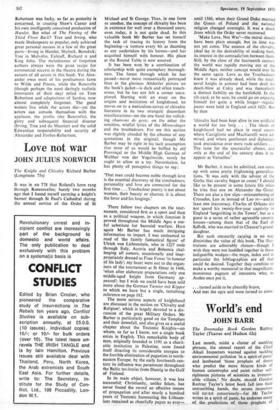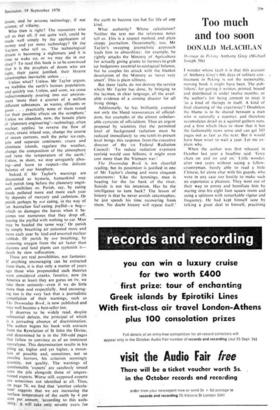World's end
JOHN BARR
The Doomsday Book Gordon Rattray Taylor (Thames and Hudson 42s)
Last month, midst a clutter of soothing phrases, the annual report of the Chief Alkali Inspectors warned against tackling environmental pollution 'in a spirit of panic' and lambasted 'those prophets of doom who predict the more bizarre kinds of human catastrophe and paint rather self- righteous pictures of scientists as irrespon- sible villains.' No doubt, should Gordon Rattray Taylor's latest book fall into their untrembling hands, the serene inspectors will tut-tut censoriously—for Mr Taylor writes in a spirit of panic, he endorses many of the predictions of those prophets of
doom, and he accuses technology, if not science, of villainy.
Who then is right? The reassurers who tell us that all, if not quite well, could be made well simply by the application of money and yet more technology? Or the Taylors who tell us, 'The technological dream is becoming a nightmare and it is time to wake up, or we may die in our sleep'? To read this book is to be convinced that it is the prophets of doom who are right, their panic justified, their bizarre catastrophes inevitable unless . . . Unless what? Unless. Mr Taylor argues, we stabilise the earth's human population, and quickly too. Unless, and soon, we cease indiscriminately pouring into our environ- ment 'more than a quarter of a million different substances as wastes, effluents or gases . . . practically none of them tested for their possible effects on the ecosphere' Unless we abandon, now, the lunatic plans of 'planetary engineering'—technology, often nuclear, applied 'to reverse the flow of rivers, create inland seas, change the course of ocean currents, melt the polar ice-caps, join and separate continents, create and eliminate islands, regulate the weather, change the composition of the atmosphere and raise the temperature of the earth' Unless, in short, we stop arrogantly abus- ing—and learn to respect—the delicate balance of our biosphere.
Indeed, if Mr Taylor's warnings are discounted as hysteria, humankind may well perish long before the planetary engin- eers annihilate us. Perish, say, by eating foods polluted more and more each year by deposits of mercury and cadmium. Or perish perhaps by not eating, in the way of 'an Australian leaf-eating psyllid—a bug— which so damages the leaves when it be- comes too numerous that they drop off, leaving the psyllid with nothing to eat. Man may be headed the same way' Or perish by simply breathing air poisoned more and more each year by lead and assorted nuclear rubbish. Or perish by not breathing, by removing oxygen from the air faster than diatoms and land plants can replenish it— death by slow suffocation.
These are real possibilities, not fantasies. If anything encouraging can be extracted from them, it is that only a matter of years ago those who propounded such theories were considered cranks, fanatics; now (in America at least) they are gurus on TV, we take them seriously—even if we do little more than nod respectfully. And encourag- ing too is the very fact that a journalistic compilation of their warnings, such as The Doomsday Book, is now published and may well become a best-seller too.
It deserves to be widely read, despite substantial defects, the principal of which is a pervading absence of discrimination. The author begins his book with extracts from the Revelation of St John the Divine, and determined he is in the 300-odd pages that follow to convince us of an imminent apocalypse. This determination results in his Piling up, higher and yet higher, a moun- tainof possible and, sometimes, not so possible horrors, his criterion seemingly quantity, not quality. The warnings of questionable 'experts' are carelessly tossed onto the pile alongside those of unques- tioned experts. Worse still, supposed experts are sometimes not identified at all. Thus, on page 74, we find that `another calcula- tion' suggests that we are increasing the surface temperature of the earth by 4 per cent per annum; 'according to this auth- ority,' it will take only seventy years for the earth to become too hot for life of any kind.
What authority? Whose calculation? Neither the text nor the reference notes tell us. This is a suspect method, and plain sloppy journalism. Occasionally, too, Mr Taylor's sweeping journalistic approach leads him to absurdities: for example, he rightly attacks the Ministry of Agriculture for actually giving grants to farmers to grub up hedgerows essential to ecological balance, but he couples his attack with the blanket description of the Ministry as 'never very smart'. This is plain silliness.
But these faults do not destroy the service which Mr Taylor has done, by bringing to the layman, in clear language, all the avail- able evidence of a coming disaster for all living things.
Additionally, he has brilliantly exposed not only the bland reassurances of official- dom, but examples of the almost unbeliev- able cynicism of officialdom. Thus an urgent proposal by scientists that the permitted level of background radiation must be reduced immediately to one tenth its present level brings this response from the executive director of _ the us Federal Radiation Council: 'To reduce radiation exposure tenfold would cost billions; it might even cost more than the Vietnam war.'
The Doomsday Book is not cheerful reading, but its pessimism is justified in one of Mr Taylor's closing and more eloquent statements: 'Like the lemmings, man is heading for the far bank of the river. Suicide is not his intention. Has he the intelligence to turn back? The lesson of history is that he never avoids catastrophes;
he just spends his time will from them. No doubt history will repeat itself.'



































 Previous page
Previous page